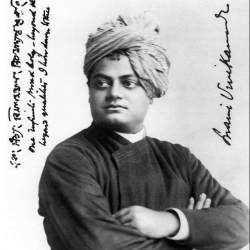
Swami Vivekananda
| Date of Birth | : | 12 Jan, 1863 |
| Date of Death | : | 04 Jul, 1902 |
| Place of Birth | : | Kolkata, India |
| Profession | : | Philosopher |
| Nationality | : | Indian |
Swami Vivekananda, born Narendranath Datta, was an Indian Hindu monk, philosopher, author, religious teacher, and the chief disciple of the Indian mystic Ramakrishna.
Biography
Born into an upper-middle-class family of the Kayastha (scribes) caste in Bengal, he was educated at a Western-style university where he was exposed to Western philosophy, Christianity, and science. Social reform became a prominent element of Vivekananda’s thought, and he joined the Brahmo Samaj (Society of Brahma), dedicated to eliminating child marriage and illiteracy and determined to spread education among women and the lower castes. He later became the most-notable disciple of Ramakrishna, who demonstrated the essential unity of all religions.
Always stressing the universal and humanistic side of the Vedas, the oldest sacred texts of Hinduism, as well as belief in service rather than dogma, Vivekananda attempted to infuse vigour into Hindu thought, placing less emphasis on the prevailing pacifism and presenting Hindu spirituality to the West. He was an activating force in the movement to promote Vedanta philosophy (one of the six schools of Indian philosophy) in the United States and England. In 1893 he appeared in Chicago as a spokesman for Hinduism at the World’s Parliament of Religions and so captivated the assembly that a newspaper account described him as “an orator by divine right and undoubtedly the greatest figure at the Parliament.” Thereafter he lectured throughout the United States and England, making converts to the Vedanta movement.
On his return to India with a small group of Western disciples in 1897, Vivekananda founded the Ramakrishna Mission at the monastery of Belur Math on the Ganges (Ganga) River near Calcutta (now Kolkata). Self-perfection and service were his ideals, and the order continued to stress them. He adapted and made relevant to the 20th century the very highest ideals of the Vedantic religion, and, although he lived only two years into that century, he left the mark of his personality on East and West alike.
Death
On 4 July 1902 (the day of his death), Vivekananda awoke early, went to the monastery at Belur Math and meditated for three hours. He taught Shukla-Yajur-Veda, Sanskrit grammar and the philosophy of yoga to pupils, later discussing with colleagues a planned Vedic college in the Ramakrishna Math. At 7:00 pm Vivekananda went to his room, asking not to be disturbed; he died at 9:20 p.m. while meditating. According to his disciples, Vivekananda attained mahasamādhi; the rupture of a blood vessel in his brain was reported as a possible cause of death. His disciples believed that the rupture was due to his brahmarandhra (an opening in the crown of his head) being pierced when he attained mahasamādhi. Vivekananda fulfilled his prophecy that he would not live forty years. He was cremated on a sandalwood funeral pyre on the bank of the Ganga in Belur, opposite where Ramakrishna was cremated sixteen years earlier.
Quotes
Arise, awake, stop not till the goal is reached.
They alone live, who live for others.
All love is expansion, all selfishness is contraction. Love is therefore the only law of life. He who loves lives, he who is selfish is dying. Therefore love for love's sake, because it is the only law of life, just as you breathe to live.
You cannot believe in God until you believe in yourself.
Neither seek nor avoid, take what comes.
Feel nothing, know nothing, do nothing, have nothing, give up all to God, and say utterly, 'Thy will be done.' We only dream this bondage. Wake up and let it go.
Comfort is no test of truth. Truth is often far from being comfortable.
The fire that warms us can also consume us; it is not the fault of the fire.
Learn Everything that is Good from Others, but bring it in, and in your own way absorb it; do not become others.
Was there ever a more horrible blasphemy than the statement that all the knowledge of God is confined to this or that book? How dare men call God infinite, and yet try to compress Him within the covers of a little book!
